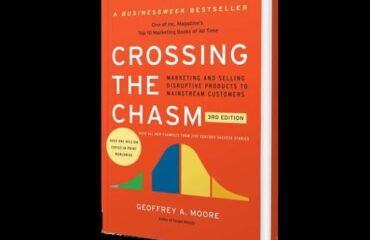
In today’s rapidly changing business landscape, every entrepreneur faces the challenge of balancing innovation with stability. But how do you know when to innovate and when to hold steady?
The book The Innovator’s Dilemma by Clayton Christensen offers critical insights into why established companies often fail to adapt to disruptive changes—and how new businesses can leverage this knowledge to avoid similar pitfalls.
If you’re an early-stage startup founder, this book will help you understand the dynamics of innovation, offering you the tools to future-proof your business.
Table of Contents
Book Overview
Introduction to The Innovator’s Dilemma
In The Innovator’s Dilemma, Clayton Christensen dives into one of the most crucial issues businesses face: why do some companies, despite being leaders in their field, fail to innovate and ultimately lose their market dominance? The book explores this phenomenon and offers a powerful framework for understanding disruptive technologies—an essential read for entrepreneurs looking to make a lasting impact.
Summary
At the heart of The Innovator’s Dilemma is the concept of “disruptive innovation.” Christensen argues that established companies often fail to adopt new technologies because they focus too much on sustaining innovations that meet the needs of their current customers, thereby neglecting breakthrough innovations that could potentially disrupt the market.
The book uses examples from industries like disk drives and steel to show how disruptive innovations create new markets, which eventually overtake established industries. Christensen outlines why these disruptions are difficult for larger companies to foresee and embrace, and what smaller companies can do to exploit these opportunities.
The book is structured around a series of case studies, which demonstrate how companies that once dominated their industries failed to respond to disruptive changes. Christensen explains how the rules of business change when disruptive technologies come into play, and how startups can take advantage of these shifts to gain a competitive edge.
Key Insights and Lessons
Key Lessons
- Disruption is Inevitable: Innovation is not just about improving existing products but about creating new ones that disrupt the market. As an early-stage founder, identifying these disruptions early can provide a unique opportunity.
- Focus on Emerging Markets: Large companies often overlook emerging markets because they are too small to meet their current customer needs. For startups, this can be an opportunity to build a customer base that will grow with the disruption.
- The Role of Innovation: While sustaining innovations improve products for existing customers, disruptive innovations create entirely new industries. Understanding the difference can help you position your startup to be the next market leader.
Quotes
- “Disruption is not about doing something better; it’s about doing something different.”
- “The most dangerous mistake an innovator can make is to think that your current customers will always want your product.”
Practical Applications
- Experiment with Low-End Disruptions: As a startup, you can focus on disrupting a lower-end segment of the market, offering something more affordable or simpler. This allows you to enter the market before larger competitors realize the potential.
- Pivot When Necessary: If you’re seeing signs of disruption in your industry, be ready to pivot. Take a page from companies like Netflix, which transitioned from a DVD rental service to a streaming giant, exploiting disruptive innovations in digital technology.
- Develop a Culture of Innovation: To remain competitive, establish a company culture that encourages experimentation and embraces new, unconventional ideas—an approach that can help your startup adapt quickly when disruption occurs.
Strengths and Weaknesses
Strengths
- Actionable Framework: Entrepreneurs appreciate the practical frameworks Christensen provides to understand disruptive innovation. The case studies offer concrete examples of how companies can both miss and seize disruptive opportunities.
- Relevant for Early-Stage Startups: The book gives startups an invaluable perspective on how to navigate the complex landscape of innovation. It’s not just about avoiding pitfalls but also recognizing and exploiting opportunities that may seem insignificant at first.
Weaknesses
- Limited Examples of Recent Disruptions: While the case studies are insightful, some founders feel the examples used are outdated and may not fully apply to the digital age or new emerging technologies. The book focuses heavily on industries like disk drives and mechanical systems, which might not resonate with tech-focused startups.
- Abstract Theories: Some readers have pointed out that the book leans heavily on theory and may lack specific, detailed strategies that are easy to implement without further guidance.
Questions for You
- What are the most significant assumptions in your current business idea that need validation?
- Which type of experiment or strategy mentioned in the book would be most suitable for your business model, and why?
- How can you identify low-end disruptions in your industry that your startup could take advantage of?
By reflecting on these questions, you can begin to think critically about how The Innovator’s Dilemma applies to your startup and what steps you should take to stay ahead of disruptive change.

Join Our Founder Network
If you’re an early-stage startup founder, applying the insights from The Innovator’s Dilemma can be a game changer. Join our Founders Meeting to connect with like-minded entrepreneurs, receive expert guidance, and ensure that your business is prepared for the disruptions of tomorrow.
Through our community, you can learn how to apply Clayton Christensen’s lessons in a practical, actionable way, positioning your startup for long-term success.
Start making smarter decisions today—because innovation waits for no one.



